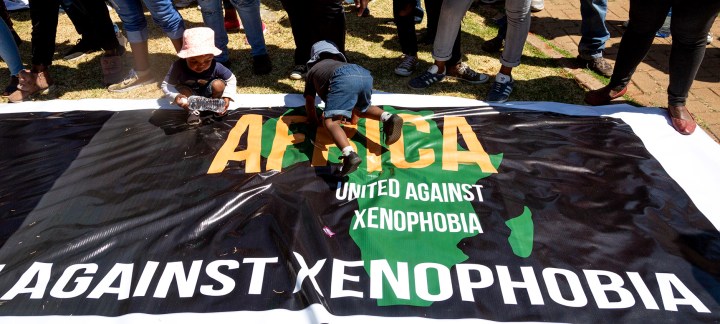MAVERICK CITIZEN 168
Survivor of xenophobic attack speaks: ‘It’s hard to believe it was the people we know who attacked us’

I decided to go back to check my place and I was astonished to find it razed. There was nothing remaining. They looted all my belongings and then removed the zinc sheets.
First published in the Daily Maverick 168 weekly newspaper.
My parents came from Mozambique, but I was born here in South Africa. I lost my mother in June 2004 and my father in October the same year. They left me a stand … and I was sustaining myself from the money tenants paid.
I was too young to look for employment then but at least with the shacks I could survive. I tried to send myself to school for about one year but then I dropped out.
When all this violence took place I was at work, where I repair radios and TVs. I returned to my place and found it in a chaotic state, as people were being attacked and trying to flee. It was dark. While I stood with friends outside my house, a group of about 12 youths came armed with knives, iron bars, hammers, spears and all sorts of weapons. They said, “We want this guy who fixes radios and TVs” and they meant myself. I said, “I don’t know this guy you are talking about.” They found my shack locked and went their way. But then this other woman they met advised them that the person they were looking for was the one they had just left alone.
That’s when I jumped the fence and fled and joined the other people running away. We spent Sunday at the police station. On Monday I decided to go back to check my place and I was astonished to find it razed. There was nothing remaining. They looted all my belongings and then removed the zinc sheets.
There had been four shacks and they had looted all of them.
These guys who were the attackers moved as a group. There were nine people who came in the afternoon and had a meeting with the local committee. These people had regalia that they tied around their heads as a mark of identification.
Without it you would be attacked. If you heard them shouting “Hey comrade”, you had to return the greeting by the same “Hola comrade”, and if you failed you would get attacked. They attacked you so that they could remove your shack and accommodate their relatives…
There was this boy who was coming home in the afternoon during the violence and he met a group of Zulu youths who were on standby, waiting to pounce on such people. When they attacked him, a lady who is also Zulu lay on top of the victim and said, “It will be better if you kill me but let this innocent boy go.” So they couldn’t continue. They said to him, “You tell your dad that we don’t want to see him here and he must leave.”
The lady escorted the boy away and he was so grateful for the lady who saved his life…
I did think of going back to Mozambique, but I am staying with a lady, a South African, and I could not just let her go like that. She is pregnant. My fiancée was also ejected from the shacks – they told her to follow her Shangaan man.
Another man told me that they came to evict his lady from the shacks. They wanted to hack off the head of their nine-month-old baby. The lady cried until they ordered her to follow her Shangaan boyfriend.
It is hard to believe that it was the people we know who attacked us and not strangers. The man who was burnt: what happened is that he went to the police and asked them to assist him after he had been chased from his place by attackers. The police just said, “Go back, we are behind you and we will find you still on the way.”
The attackers waited for him and when they realised that he was not under police escort they captured him just as he left the station, tied him up, poured paraffin on his body and set him alight. The police did nothing. DM168
This is an edited version of a survivor’s* story that was recorded by Phefumula Nyoni as part of the Wits Forced Migration Studies Programme’s Documenting Experiences of Xenophobic Violence Study at the African Centre for Migration & Society, which appears in Go Home or Die Here: Violence, Xenophobia and the Reinvention of Difference in South Africa, edited by Shireen Hassim, Tawana Kupe and Eric Worby, published by Wits University Press. www.migration.org.za
* Survivor’s name withheld
This story first appeared in our weekly Daily Maverick 168 newspaper which is available for free to Pick n Pay Smart Shoppers at these Pick n Pay stores.





















 Become an Insider
Become an Insider
Comments - Please login in order to comment.